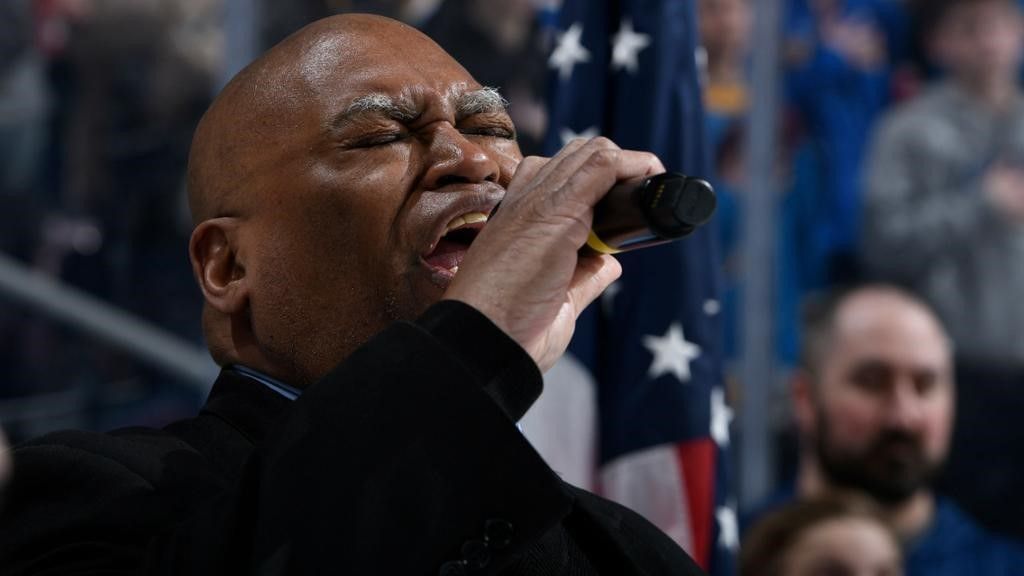Charles Glenn feels it in his joints as he walks through the concrete concourses of Enterprise Center in St. Louis. The staircases make his hips ache in ways they hadn’t until a few years ago. But when he steps out in front of more than 18,000 fans at St. Louis Blues home games, those agonies fade to the shadows, displaced by the task at hand.
“You’re the person who sets the energy. You’re setting the mood and the atmosphere for what’s about to happen,” said Glenn, 64, who has been singing the national anthems at Blues games for 19 years.
His rendition of “The Star-Spangled Banner” is soulful. It has moments when Glenn hits a note with such bluster that it threatens to blow the doors off their hinges. When he reaches the word “free” near the end, he stretches it out as the fans roar, giving the song the zenith it demands before the home crowd adds its own twist.
“The players get excited, the fans get excited,” Glenn said. “And know you’ve done your job if you can feel that energy, hear that ‘home of the BLUUUUUUUUES’ at the end.”
When the energy subsides, Glenn feels those aches again. It has been seven years, going on eight, since Glenn was diagnosed with multiple sclerosis, a disease that affects the central nervous system by disrupting the connection between the brain and the rest of the body.
“When you do a sporting event, in an arena or a stadium, there’s a lot of walking, and a lot of walking on concrete,” he said. “Every year it got a little more difficult for me. So this year, I decided there were other things I wanted to do.”
Glenn decided back in January that this would be his final season singing the anthems for the Blues. At the time, St. Louis was a last-place team. He figured he’d sing through their regular-season finale, and that would be that.
Then the Blues won 11 games in a row in February. They found a rookie goalie in Jordan Binnington, who helped save their season. They went from worst in the conference to a playoff spot to postseason series wins over the Winnipeg Jets in six games and the Dallas Stars in seven games.
“And here we are in the [Western Conference] finals, against San Jose. I didn’t see this coming at all,” Glenn said.
The longer the Blues play on in the postseason, the longer Charles Glenn gets to sing the anthem.
Glenn isn’t sure if this run by the Blues, and the impending end of his run as the anthem singer, are somehow cosmically related. Or at least he’s not willing to admit he’s thought as much. “I don’t know. They’ve been playing awfully hard lately. They skate by me and give me a wink, and I’m like ‘OK, OK … I’ll take that,'” he said, laughing.
The unpredictability of life is something Glenn has come to appreciate through the years, from the way he fell into this anthem gig … to getting body-slammed by a man named Meat Loaf.
Around 1984, Glenn was singing with his band in St. Louis when another band walked into the club and heard them. It was the backing band for Meat Loaf, the mountainous singer behind the momentous album “Bat Out of Hell,” which has sold more than 43 million copies since its release in 1977. They heard Glenn and asked if he’d like to open for them the following night.
“But they said, ‘We’re not going to tell him, but you’re going to walk on stage during a song. And then you’re going to sing with him. If he likes you — well, he’s going to love you. But if he hates you, well, he’s going to pick you up and body-slam you. Right on stage.'”
Glenn agreed to the terms, fully aware of the size disparity between himself (“That was 100 pounds ago,” joked Glenn) and the former football player known as Meat Loaf. So as the band did a cover of “Brown Sugar,” by the Rolling Stones, Glenn came out to sing a verse before Meat — his friends call him “Meat” — challenged him to a sing-off.
“He hit a note, and then he asked me to hit a higher note. And let me tell you that he’s a phenomenal singer. So he hits a really, really high note, and the crowd goes crazy. And then I hit a note that’s higher than that, and the crowd goes even more nuts,” Glenn said.
Meat Loaf’s reaction?
“He picked me up and body-slammed me,” he recalled, laughing heartily. “Then, as I’m walking off the stage, he grabs me by the arm and says, ‘C’mon, you’re finishing this night up.’ And after the show, we sat backstage just talking. He was such a sweet man. But yeah, I got body-slammed.”
It wouldn’t be the only time someone attending his club gigs would present him with an exceptional opportunity.
Jill Hahn, a season-ticket manager for the Blues, would see Glenn’s band at a local jazz club. One day she called him to let him know that the team was holding auditions for a new anthem singer, but that they were invitation-only. So her advice was to head to the arena and just say he was there for auditions, because why else would someone be there were they not invited, right?
Glenn walked up to the arena at around 4 p.m., and that’s exactly how he got into the audition. “We all sat right behind the penalty box. There were about 35 of us. And they start by asking how many of us knew the Canadian national anthem. About 12 of us raised our hands. And they told everyone else to leave,” said Glenn, who had learned “O Canada” for a gig at an insurance convention in Quebec City.
Glenn was the eighth singer to audition that day, and he was convinced he wasn’t getting the gig. His mic cut out five words into “The Star-Spangled Banner,” though he kept on performing. When the mic was repaired, he asked if he should sing the Canadian anthem, and they told him he was done.
Glenn soon found out it wasn’t that he was that bad, but rather that he was that good. He received a call from the Blues two days later asking him to perform at their home opener.
He would go on to perform the anthems for 19 years.
But in 2011, he noticed something was amiss. Glenn was walking inside the arena when he took a nasty fall down a flight of stairs. “I’m clumsy. I know I’m clumsy. But it was unlike me to fall down the steps like that. And I had prior instances of falling. Just losing my balance and falling,” he recalled.
Taking the advice of many concerned people in his life, Glenn went to his doctor, who did some physical tests and suggested that he see a specialist, who did a CAT scan, an MRI and a spinal tap.
“After those tests, the doctor called me and asked me to come in,” said Glenn, whose concern levels spiked when the specialist added, “and bring your wife with you.”
The doctor found six lesions in his head and told Glenn that medication could slow the progress of their growth. He used the words “multiple sclerosis” for the first time and left the Glenns alone to discuss the diagnosis.
“What are we going to do?” Charles asked his wife, Nikki.
“We’re going to keep going. You don’t know anything about it. I don’t know anything about it. But we’re going to fight this together,” she replied.
Glenn worked through the symptoms for the next several years but decided that this season needed to be his last after talking it over with Nikki and his daughter Elizabeth, 32, who was formerly a member of the team’s Blue Crew.
“I had given the Blues 19 years. I thought now was the time to throw in the towel. Not give up, but that part of my life has to stop,” Glenn said.
So he told the Blues he was done, thinking it was obvious that the state of his health necessitated a change. “And they told me, ‘We don’t want you to go,'” he recalled.
“But I told them that I have to.”
Brad Lee is a St. Louis Blues fan who has published “Game Time,” an independent game program, for 24 years. He has seen his share of good times and much more lean times during that span.
“When the team was near the bottom of the standings from 2005 to 2008, hearing Charles was one of the highlights of the game because he always brings emotion to it,” he said. “He is a celebrity of his own right, and we make it a point to be in our seats before the anthem, because it’s a part of the game experience that simply can’t be missed.”
At the team’s regular-season finale, Lee noticed what many noticed about Glenn’s performance: that his silken vocals were overpowered by raw emotion.
“He got a huge ovation before the last regular-season home game. Blues fans knew the team and he would be in the playoffs, but I think fans wanted to say thanks and show him support. And if you listen to the video, his voice breaks on the first line, but he’s professional. He got through it, strong as ever, and then said, ‘I love you St. Louis’ at the end,” Lee said. “We love him, too.”
These outpourings are everywhere, Glenn said. Wherever he goes, there’s inevitably a Blues fan wishing him well. “Everybody has been giving me love. They say they’re praying for me, giving me hugs,” he said.
That includes the Blues themselves.
Forward David Perron, who has played on and off for the Blues since 2007, would run into Glenn in the bowels of the arena when rehabbing from an injury. He’d say hi, give him a pat on the back for encouragement.
After the Blues won Game 7 of their conference semifinals series at home against the Stars, Perron realized that their loss would have meant Glenn’s final performance. And that got him thinking about all the members of the organization, on and off the ice, who have given their all to the team.
“Obviously, in St. Louis, we haven’t won a championship yet,” Perron said. “We don’t always realize how many people invest their life into an organization and don’t always get rewarded.”
Ask Charles Glenn how he feels about the team, and he’s quick to declare “I bleed Blue.” He always will, whether or not he’s singing before their games. But the more they win, the more he sings, until he doesn’t anymore. Then he’ll focus on his health, his family and Voices for the Cure, an event for emerging singers that Glenn has held locally and intends to take on the road, with proceeds benefiting the fight against MS.
But he also has one more responsibility when the singing stops: helping to find his successor for the Blues.
“And I’m going to be a tough judge,” said Glenn, laughing. “I’ll pick ’em up and body-slam ’em.”

